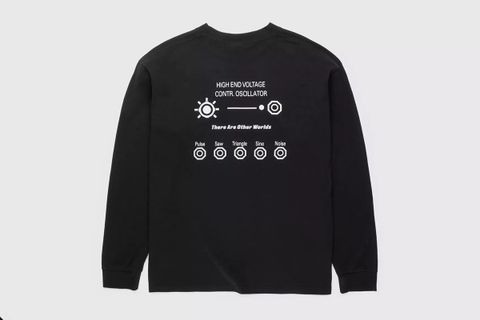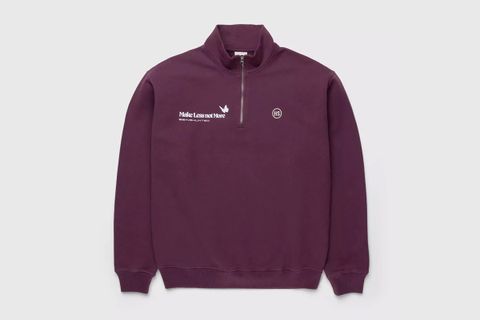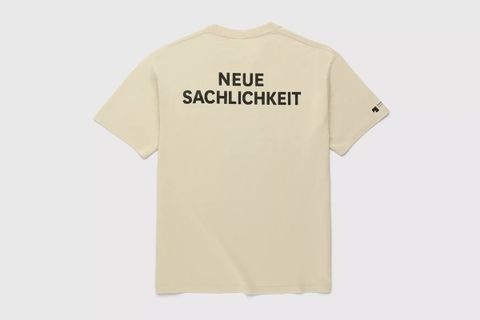SÄCK & NOLDE Distributed Streetwear Before It Was Called Streetwear
The third edition of BERLIN, BERLIN has arrived. From in-person pop-ups and parties, to exclusive content and products, we're delving into Berlin's creative culture. Explore the content here and browse the drops here. BERLIN, BERLIN is made possible thanks to support by the Berlin Senate Department for Economics, Energy and Public Enterprises.
"It was two guys in their early 20s running around America... we stumbled into everything by coincidence," says Klaus Nolde about the first trip to America with his business partner Manfred Säck.
In the early 90s, after having met at university and initially not liking each other, they somehow found themselves embarking on a mission to the land of opportunity in search of a product they could import back to Germany and ended up engulfed in the country's early streetwear scene.
Arriving without any connections or real plan, the duo entered shops out of curiosity and, on the second day, a worker at the Union store in Soho, New York pointed them towards an issue of The Source magazine which had a list of addresses to various local shops around the country. It became their tour guide for the following six weeks as they visited the spots on the list using a Delta Airlines Standby Ticket, fueled by a diet of weed and junk food.
"We were running around finding people that looked like-minded and then visiting all these places. We read back through our notes and it stuck out that: wow, we were really high all the time," says Klaus, having dug through their archives to share artifacts from the past 30 years with Highsnobiety. "It was a long time ago, it's not like that anymore. Everything became a business, but that was a really fun trip,"
The business which that journey around America spearheaded is a distributor at the forefront of Germany's street fashion market. It has become the in-between point for labels such as Babylon LA, Gramicci, and Stüssy to get into stores in Germany and across Europe.
Stüssy has been with the duo from the early days, back when they had a handful of American labels on their books, including X-Large, a brand which they ordered on that first trip to America after discovering its Gorilla-head logo at the brand's store in Los Angeles.
"We stumbled into that world in the early 90s, that whole area in L.A. and especially Glendale. It was amazing to be in the Grand Royal office where the Beastie Boys' Check Your Head album was recorded. Sonic Youth, Kim Gordon, Sophia Coppola... at that time in the early 90s everyone was there," says Klaus. "It is a pretty unknown area right now but it was where that specific crowd was hanging around and we were able to be in that bubble, although maybe not in the center of it."
After phoning up the X-Large shop to take a look around before it opened, they were greeted by Adam Silverman, a now highly-respected pottery artist, and things immediately clicked. But it was only once they received the boxes back in Germany that they found out Mike D of the Beastie Boys was a co-owner, something they learnt when a skater friend from California was visiting.
"We were like: 'no, that's not the Beastie Boys brand. We didn't see any Beastie Boys,'" says Klaus. "That was a kickoff point for us to also get press and have something to say about the brand. We had meetings with Mike D, as crazy as it sounds, we saw them in the warehouse, and we got backstage tickets for concerts."
Armed with the information that they had bought $3,300 worth of Mike D's brand, the two went on their first trip to a shop, a drive to Lübeck in their old VW Passat — "why the hell did we go to Lübeck? I guess we'll never know," the company founders say.
With a tent in the back of the car, which they often slept in when money was too tight for a hotel, they hung out until they saw someone they considered well-dressed, who told them that the best shop in the area was LONO. That ended up being the first shop they worked with — and that's how they did things before the internet.
"You didn't really know what was happening in other cities unless you went there," says Jörg Haas, the founder of creative agency Beinghunted. who previously owned the Berlin store Firmament. "People like Klaus and Manfred made it possible because after a few years they had the distribution set up. If you couldn't afford to go abroad to buy things, it would be exciting to have those guys come by your shop."
From that trip to Lübeck, it snowballed and the SÄCK & NOLDE of today began to take formation. They started to distribute more streetwear heavyweights such as Undefeated, as well as Phillies Blunt cigars which had gained traction from rap music and the film Kids (1995), and the hyped British label Silas & Maria.
"We ran our businesses by collaborating with a spread-out, but reasonably tight-knit group of like-minded independent entities, wherever they might be. Klaus and Manfred created one such entity," says Russell Waterman, who co-founded Silas & Maria with his partner Sofia Prantera, who went on to found Aries
"I’m not a nostalgic individual. However, I will say there was something special about the 1990s and early 2000s. For me, it was independence from mainstream commerce and the excitement of being a part of a vanguard that was spreading ideas and creative expression through our brands and relationships," continues Waterman. "It was a brief time as 'the money' soon caught up and corporate commerce got super smart about how to get involved and control consumption."
One of the early streetwear labels to come from London, it gained a cult following worldwide, especially in Japan. And before the internet, much of this was generated by the distributors like SÄCK & NOLDE.
"I think there were a lot more shops than today. It was not as defined, but the beauty of Germany was that you would go into a small town with around 100,000 people and there were some kids running a skate shop or a streetwear shop. It was still a very new market, very fresh, very untouched," says Klaus — "It wasn't called streetwear. I think it was more called club wear," adds Manfred.
One of the more elusive and maybe less glamorous sides of the industry, SÄCK & NOLDE is part of a network that keeps the fashion industry moving and shop floors stocked. And while today they have doubts whether anyone could make a success in the industry going into it with as little preparation as they did, the best piece of advice they can give is "höre auf dein bauchgefühl," says Manfred — a German saying along the same lines of "follow your gut."
It's what has gotten the pair from a badly-planned trip to America to distributing certified streetwear royalty over a 30-year period, and then going on to opening their own online shop, Sehr Goods, a fashion and lifestyle store based around the concept of a general store.
The pair have watched the scene develop from walking into the Union store on that first America trip while James Jebbia was still a store worker to seeing his label Supreme collaborate with Louis Vuitton.
Today, it is celebrating 30 years in the industry and remains as integral to Germany's street fashion scene as it did in the 90s; but it keeps a low profile, operating behind the scenes.
"We always felt like: who cares about a distributor?" Says Klaus. "There was a time when people said, 'oh, but you're a brand too, distributors are brands now.' But I don't think so, I don't produce any product, we want to be a good partner for the people we work with."
They have never moved from their hometown of Bochum, a humble small town in middle Germany, and if you google the name SÄCK & NOLDE there is very little about the company which you can find. It isn't coincidental, they are too busy putting other brands in the limelight and on shop floors to need any type of PR.
"I really appreciate how unpretentious they are — and they could be a little more outspoken," says Jörg Haas. "They will help Jason Markk be established in Europe or open a Stüssy store in Amsterdam but you won't see their name on anything."
There's no saying what influence the guys at SÄCK & NOLDE will have on fashion over the next 30 years, but you can bet on them not shouting about it.


